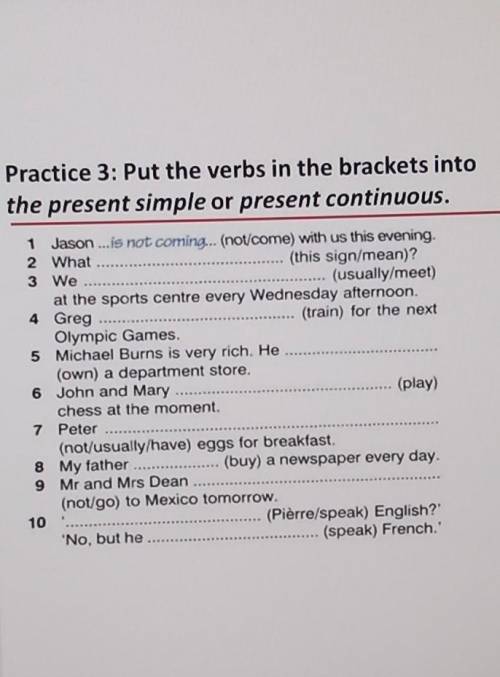Practice 3: Put the verbs in the brackets into the present simple or present continuous. 1 Jason ... is not coming...(not/come) with us this evening. 2 What (this sign/mean)? 3 We (usually/meet) at the sports centre every Wednesday afternoon. 4 Greg (train) for the next Olympic Games, 5 Michael Burns is very rich. He (own) a department store. 6 John and Mary ... (play) chess at the moment. 7 Peter (not/usually have) eggs for breakfast. 8 My father (buy) a newspaper every day. 9 Mr and Mrs Dean (not/go) to Mexico tomorrow. 10 (Pierre/speak) English?' "No, but he (speak) French. 27

Другие вопросы по теме Английский язык
Популярные вопросы
- Знайти значення виразу 18х-18у якщо х-у=23...
2 - Длина радиуса 7см. чему равна длина этой окружности? ...
1 - Характеристика мцыри по тексту. плз...
3 - А) начертите угал аов; 5) внутри угла проведите луч ос: с) найдите величину угла...
2 - Решите на множестве n уравнения: а) 3(1-2x)+8=32 б) 60÷(3y+2)=12 в) 1-3(8x-4)=1...
3 - Даны 3 числа найти произведение тех из них которые по модулю меньше 1 написать...
2 - Есе на тему з чого зіткане щастя? контрольного типу (2 сторінки) 10-ий клас....
1 - Значение в природе грибов отдела оомикота. кратко, в 1-2 предложения. ...
2 - Почему так важен здоровый сон? 8 предложений...
3 - F(x)=5-4х , найдите область определения функции...
2
1:Jason is not coming with us this evening. 2: What does this song mean? 3:We usually meet at the sports centre every Wednesday afternoon. 4:Greg is training for the next Olympic Games. 5:Michael Burns is very rich. He owns a department store 6:John and Mary are playing chess at the moment. 7:Peter doesn't usually have eggs for breakfast. 8:My father buys a newspaper every day. 9:Mr and Mrs Dean aren't going to Mexico tomorrow. 10: Does Pierre speak English? No, but he speaks French.
1. Jason is not coming with us this evening. (not/come)
- The correct form is "is not coming" because we use the present continuous tense to talk about actions happening at the moment of speaking or actions that are planned for the future.
2. What does this sign mean? (this sign/mean)
- The correct form is "does this sign mean" because the question is asking for the present simple tense, which is used to talk about general truths, habits, or permanent situations.
3. We usually meet at the sports centre every Wednesday afternoon. (usually/meet)
- The correct form is "usually meet" because it is a regular habit or a permanent situation.
4. Greg is training for the next Olympic Games. (train)
- The correct form is "is training" because the action is happening at the moment of speaking or is a planned action for the future.
5. Michael Burns is very rich. He owns a department store. (own)
- The correct form is "owns" because it is a permanent situation or a general truth.
6. John and Mary are playing chess at the moment. (play)
- The correct form is "are playing" because the action is happening at the moment of speaking.
7. Peter doesn't usually have eggs for breakfast. (not/usually have)
- The correct form is "doesn't usually have" because it is a negative statement about a regular habit.
8. My father buys a newspaper every day. (buy)
- The correct form is "buys" because it is a general truth or a habitual action.
9. Mr and Mrs Dean are not going to Mexico tomorrow. (not/go)
- The correct form is "are not going" because the action of going to Mexico is a planned action for the future.
10. Is Pierre speaking English? "No, but he speaks French." (Pierre/speak)
- The correct form is "Is Pierre speaking" and "he speaks" because the question is about the present continuous tense, and the answer is about the present simple tense.
I hope this explanation helps you understand the use of the present simple and present continuous tenses. Let me know if you have any further questions!